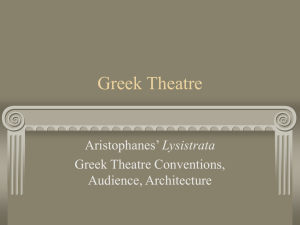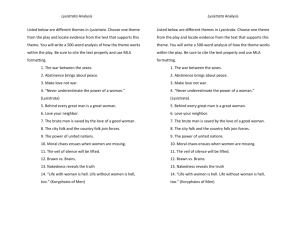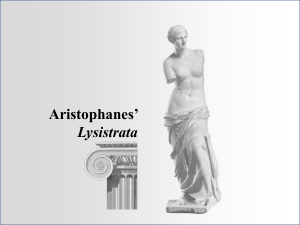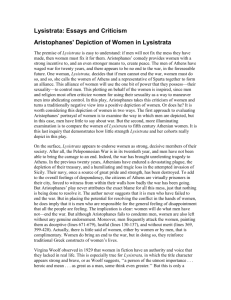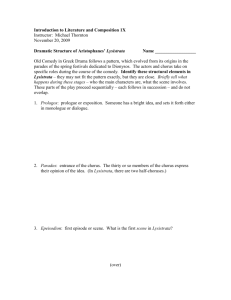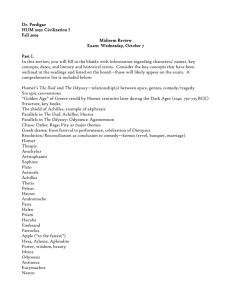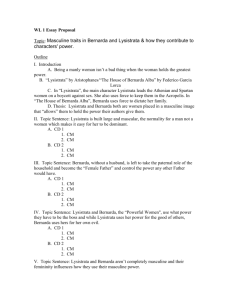Lysistrata: Feminism & Women in Greek Theater Essay
advertisement
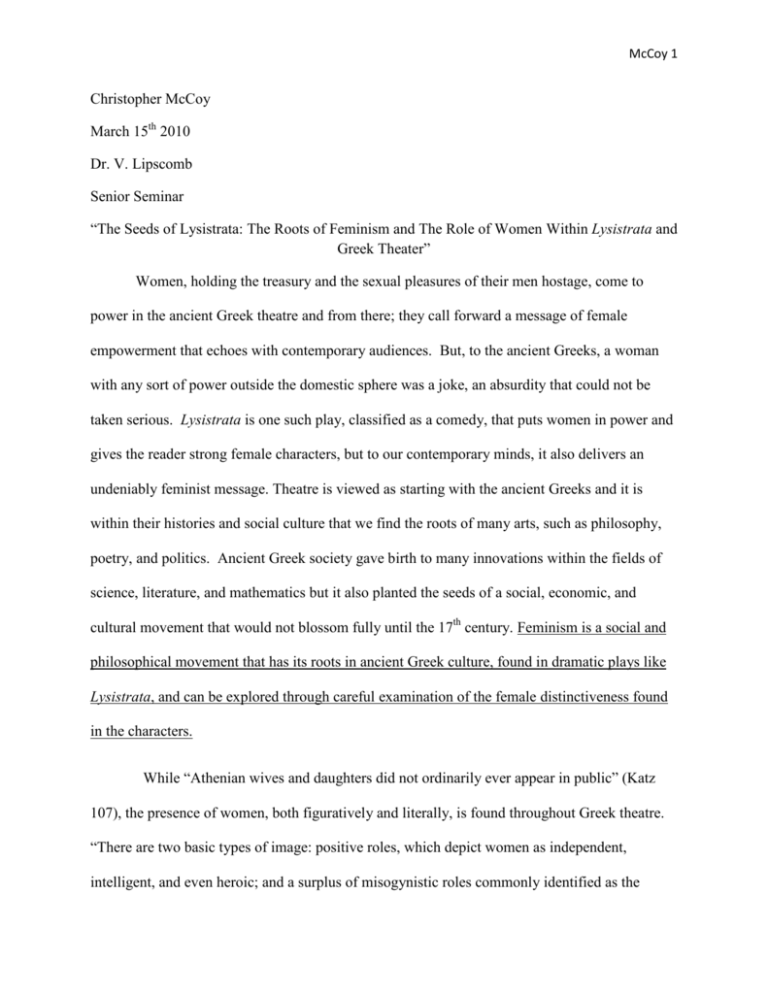
McCoy 1 Christopher McCoy March 15th 2010 Dr. V. Lipscomb Senior Seminar “The Seeds of Lysistrata: The Roots of Feminism and The Role of Women Within Lysistrata and Greek Theater” Women, holding the treasury and the sexual pleasures of their men hostage, come to power in the ancient Greek theatre and from there; they call forward a message of female empowerment that echoes with contemporary audiences. But, to the ancient Greeks, a woman with any sort of power outside the domestic sphere was a joke, an absurdity that could not be taken serious. Lysistrata is one such play, classified as a comedy, that puts women in power and gives the reader strong female characters, but to our contemporary minds, it also delivers an undeniably feminist message. Theatre is viewed as starting with the ancient Greeks and it is within their histories and social culture that we find the roots of many arts, such as philosophy, poetry, and politics. Ancient Greek society gave birth to many innovations within the fields of science, literature, and mathematics but it also planted the seeds of a social, economic, and cultural movement that would not blossom fully until the 17th century. Feminism is a social and philosophical movement that has its roots in ancient Greek culture, found in dramatic plays like Lysistrata, and can be explored through careful examination of the female distinctiveness found in the characters. While “Athenian wives and daughters did not ordinarily ever appear in public” (Katz 107), the presence of women, both figuratively and literally, is found throughout Greek theatre. “There are two basic types of image: positive roles, which depict women as independent, intelligent, and even heroic; and a surplus of misogynistic roles commonly identified as the McCoy 2 Bitch, the Witch, the Vamp and the Virgin/Goddess” (Case 6). Within comedies such as Lysistrata, we often see the strong female images of women presented by male playwrights. Greek theatre, both in the classical tragedy and Old Comedy traditions, holds many female characters that are considered strong, independent, and capable of being leaders while men are unable to fulfill the roles of their society. “The picture of a strong, independent, intelligent, and capable woman obviously pleased the Athenians because they permitted the play [Lysistrata] to be performed more than once” (Jacobus 106) and this further develops the argument that among some Athenians, the seeds of a feminist society had been planted. However, it is also important to keep in mind that the Greeks found the very idea of women in power to be absurd, hilarious, and thus it was used by male playwrights of the period to create comedy and not something serious like tragedy. By analyzing Lysistrata as a reader with a modern mindset and one who views it as the ancient Greeks did, one can see how the seeds of feminism would eventually be planted by later minds reading the ancient works and finding female empowerment within them. Lysistrata begins with an oath being sworn by the gathered women of Athens and those other nations that are involved in the latest round of war. The women take up a chalice filled with wine and swear: I will have naught to do whether with lover or husband, albeit he come to me with an erection. I will live at home unbulled, beautifully dressed and wearing a saffroncolored gown. To the end I may inspire my husband with the most ardent longings. Never will I give myself voluntarily, and if he has me by force, I will be cold as ice, and never stir a limb. I will neither extend my Persian slippers toward the ceiling, nor will I crouch like the carven lions on a knife-handle. And if I keep my oath, may I be suffered to drink of this wine. But if I break it, let my bowl be filled with water (Osmand 12). McCoy 3 In this oath, Lysistrata implores her followers, her soldiers, to refuse sex with their male counterparts until they agree to a pact that ends the war. This oath represents an important factor of Greek society, the religious and honorable swearing of an oath to the gods. It is the first real indication that the women of Athens and the other national powers involved in the war are going down a path that few women have taken before them; the path of the defiant woman ready to stand against the patriarchy of her society. This oath is a masculine display of power, a means in which to show that the women in Lysistrata are not typical of their society and are serious in regards to their plan of action. However, this oath is also satirical when looked through the ancient lens of the Greek audience because to them, no gods would honor a woman’s word and give her the ability to fulfill, let alone maintain, such a ridiculous oath. It was an absurd concept and one that further drives home the character of Lysistrata. Lysistrata, being charismatic, cunning, and intelligent, also “deploys powers originating in cult and religious activities, both public and private, presided over primarily by women…historically, women frequently participated in ritual activities on the acropolis and thus belong in this public space as much as or even more than men” (Foley 8). It is here, in this oath, that the women unify under the banner of Lysistrata, whose name literally means “ArmyDisbander. Lysistrata, as a woman, has taken to unifying the women of Greece to stop a war and has thus entered into the public domain of men. “Public life is privileged…while private life remains relatively invisible. ...public life is the property of men, and women are relegated to the invisible private sphere” (Case 7). It is here, in the public part of society, that women “… were assumed to be naturally passive, sexually as well as socially…with an inability to participate in civic matters, appear on their own behalf in court, or conduct significant economic business on their own” (Ormand 9). Women were not allowed to hold the power that Lysistrata and her McCoy 4 compatriots seek. According to the male contemporaries of the day, “...it is of fundamental importance to distinguish between private and public lives of women” (Case 6), save they think themselves better than men. The division of the two worlds in which women dwell in Greek society “confine women to childcare, the provision of food and clothing, and the guardianship of household goods in the internal sphere and men to agriculture and political, military, and social activity in the external sphere” (Foley 3). This division of labor, both sexual and economical, is challenged in Aristophanes’ play. The female characters of Lysistrata have taken to being the ones in power and they have taken over the economic and political reins of the city of Athens. They are able to turn aside the soldiers, both young and old, who dare stand in their path. They also capture the Acropolis, where the money that is paying for the war is kept. They “turn the public realm into a domestic economy and the city center into a private household in the language and sometimes in the action of the play as well” (Foley 7). This conversion of the public, political center of the city into a private, larger representation of the domestic domain gives the women of Lysistrata financial and social power and control over the affairs of the city. They have become the caretakers of society, the “mother figure” of Athens and the transformation has made the people, including the now powerless men, their children. Aristophanes uses this as a way of inverting Greek society and showing yet another element of his satirical wit, yet to a contemporary audience, the situation is less comical and more realistic. Women hold the reins of power and it creates this element of feminist power for the female characters of the play. The Acropolis has become not only the heart of Athens itself but also the heart of the women who walk its walls, seeking out peace by denying their husbands and lovers access to their most intimate of domains. “The image of the walled acropolis becomes, like the household, an enclosed, carefully guarded female realm that McCoy 5 the males are trying to penetrate first with sticks, then with phalluses” (Foley 7) and the women, as the holders of the keys to both public and private bliss, deny them entry. According to Foley, “The female intruder acts in the interests of [the family, the private sphere]: children, the guardianship of the material resources of the family, and noncompetitive or cooperative values” (2) and it is the championing of the goals of a peaceful private domain that Lysistrata and her followers are following. The female characters assemble together as an “army” to not take complete power over society and reform it completely but to return society to the time of peace and prosperity. “In Lysistrata, the "female intrusion" does not…result in the destruction of the interests of either private or public spheres but in peace and a return to the status quo -marriage-in sexual relations” (Foley 5) and the female characters of the play are more than willing to return public power to the men after their demands are met. While heroines like Lysistrata leave the traditional female role of the home to challenge and take up male roles, “the heroines, while they claim to act in the interests of both sexes, argue that they will restore political harmony by applying the values and techniques of the domestic world to public policy and then proceed to do so. The women's movement into public life comes as a response to men's failure to fulfill their own responsibilities” (Foley 4). This return of power; political, social, and economic; and the fulfillment of the promise the women made is what truly brings peace between not the genders and the warring societies. Aristophanes wrote the characters of both genders as comedic representatives of not only their social roles but also of their sex. The male soldiers of the play are powerless in the event of the wily women’s refusal to please them sexually. They are quite literally weighted down by their phalluses, their physical symbols of their public power. This swelling of their groins represents not only the public power they hold but also the sexual influence and control they hold McCoy 6 over women. They are unable to function and are in turn submissive to the demands of the women within the play. They cannot fulfill it themselves and need that control over their sexual gratification taken over by the controlling women. This is Aristophanes being satirical not only about the gender itself but also the war mongering ways of his society. The men are hilariously portrayed and are unable to maintain their grasp on the social and political power that has been taken away by the women. The male characters seek to isolate the women and “…control their sexuality and preserve both male energies and male property” (Freedman 255). The men have exerted their energy and the women, the ones in power within the play, have taken control of their property, in the form of the Acropolis and the very homes in which they fight to protect. This in turn leads to “the women's movement into public life that comes as a response to men's failure to fulfill their own responsibilities” (Foley 4). The women in Lysistrata, particularly the characters of Lysistrata and Lampito, her Spartan counterpart, are cast in a positive, powerful light. “Unlike Aristophanes' outrageous male heroes, both Lysistrata and Lampito are treated in this play as mature, prominent citizens with reputations of their own. Both [women] are known to all the male characters and neither is addressed by her husband's name or associated explicitly with a man” (Foley 9), as they hold power created by their own volition rather than that granted to them by their husbands and their status. These two women are strong willed, intelligent, and capable of keeping the other, less stalwart minded women in line and unified in the face of their male adversity. The other female characters in Lysistrata are concerned with their own sexual needs and other frivolous pursuits like shopping and keeping house. It is only through the strong leadership, mental cunning and quick wits that Lysistrata and Lampito, to a lesser extent, keep their “soldiers” in line. McCoy 7 The feminist qualities most evident in Aristophanes’ Lysistrata come from the play’s namesake herself. “Lysistrata becomes a public figure who transcends the follies of both sexes, each of which retains to the end its traditional comic vices, and acts to reveal precisely those areas-specifically religious ones-in which there is ultimately no division between public and private interests” (Foley 11). She is the bridge between the private, domestic domain that women traditionally are confined to and the public political and economic realm that is the seat of masculine power. She laments being a woman, saying “I'm positively ashamed to be a woman- a member of a sex which can't even live up to male slanders! To hear our husbands talk, we're sly, deceitful, always plotting, monsters of intrigue..." (Jacobus 113). Yet it is these strengths of slyness and intrigue that allows Lysistrata to seize power in the public domain and give her cause volition. The very qualities that the playwright Aristophanes makes her lament are ironically the very feminist strengths that power Lysistrata’s power of character. These qualities are also the traits of the oppressed in society; the downtrodden and powerless often turn to slyness and deceit to find some measure of empowerment and survivability. Lysistrata embraces the idea that the genders can be equal within an existing power structure and she uses this belief to take economic and political power from the men, returning it once she has received the peace that she so desperately wishes for. This returning to tradition, the stepping down of female power in favor of male rule, is the very balance that Lysistrata has strived to achieve. However, by establishing peace, Lysistrata and her women have returned the men to the private domestic domain, a domain ruled by the female members of society. This is a balance but it also gives the illusion to the male characters of the play that they rule society alone, but it is in fact a join partnership that exists during peace and allows Greek society to prosper. Within the context McCoy 8 of Greek theatre and the play Lysistrata, the reader can easily see the beginnings of modern day feminism, but how is feminism defined within the context of contemporary scholars? Feminism can be defined a variety of ways. According to Freedman, a scholar of feminist theory and a prizewinning historian of women’s studies, “feminism is a belief that women and men [are] of equal worth. Because most societies privilege men as a group, social movements are necessary to achieve equality between women and men, with the understanding that gender always intersects with other social hierarchies” (7). Strong feminist characters possess a driving desire to see the female gender on equal footing with their male counterparts, using qualities such as quick wits and a strong leadership ability that is often traditionally associated with masculine characteristics. These male counterparts include the masculine order of power, such as the ruling government, as well as their very husbands and fathers of their children. Freedman goes on to elaborate that “anyone who challenged prevailing gender relationships could now be called a feminist” (5) by this definition. Playwrights such as Aristophanes could be defined as feminists by this definition, as the women in Lysistrata are able to use their experiences within the domestic sphere and their sexuality to influence the traditionally male domains of war and politics. However, Aristophanes was mostly likely making fun of the society in which these women existed, rather than showing just how plausible it would be for society to run with women in charge. The very idea was seen as absurd and lacking any sort of serious nature, thus the play was labeled as a comedy. While “from a feminist perspective, initial observations about the history of theatre noted the absence of women within the tradition” (Case 5), there is an abundance of powerful female characters found within many of the plays from the Classical era of Greek theatre. Examples of this include Iokaste from the tragedy Oedipus and Lampito and Lysistrata from Lysistrata. In McCoy 9 Lysistrata, ”women dominate the action, see the stupidity and waste of the war and devise a plan that will end...The suffering of women” (Jacobus 106). With this understanding of Lysistrata’s motivation for wishing to see her beloved Athens and its men, as well as its women who “pay taxes in babies” (106), removed from a pointless war, the contemporary audience can see feminist qualities but the ancient Greek audience would have continued to find the very idea nothing more than a comical fancy. This mentality is further developed by the historical evidence that shows women in ancient Greece were altogether absent from the world of theatre. Women in ancient Greek theatre were absent as both actors and part of the audience and historical evidence suggests “…that women did not attend theatrical presentations in ancient Athens” (Katz 105). Female parts within ancient Greek drama were “played by male actors in drag, while real women were banned from the stage” (Case 7), a practice that persisted for centuries and well into the Elizabethan era of England, yet the plays of the time put “emphasize a women's secluded position and limited role in political life, while frequently presents women in dominant, often publicly aggressive roles” (Foley 1). This dichotomy presents an intriguing position within Greek theatre, as the female characters are strong and willful but are physically absent from the stage itself. It is of interest that male actors who “imitate women too successfully in tragedy and comedy are rendered feminine and powerless” (Ormand 10), thus furthering the stereotype that women held no power nor was the notion taken seriously by Greek society. This substitution of real women for their male actor counterparts was only one of the reasons why feminist critics focused on the study of the female characters of these male written plays. “Our notion of drama stems from [the festival of ancient Greece]…in the sixth century, both men and women participated in them, but during the fifth century, when the ceremonies McCoy 10 were becoming what is known as theatre, women disappeared from the practice” (Case 7) and thus represented some sort of shift in Greek politics and society. There has never been any reason or laws found that mark this shift from allowing women to participate in the religious aspect of Greek society. The study of feminism in “the classical periods became possible by studying the image of women within plays written by men…as there was an absence of women playwrights” (Case 5). This lack of female playwrights led to in-depth study of the female characters found in plays like Lysistrata and the study of how these characters were portrayed. This was because there was no female perspective written by a female hand for historians and social critics to study and understand, forcing them to consider the female characters written by male writers as the only source of female perspective. “Originally feminist historians used these theatrical portrayals of women as evidence for the kind of lives actual women might have lived in [the Classical] period” (Case 6) but this type of study was limited in scope and depth. It took “…new kind of cultural analysis, based on the interplay of cultural and socio-economic evidence, to discover the nature of women’s lives in the classical periods” (Case 6) and this allowed for a more complete study of what were considered feminine qualities during that era. These qualities included strong feminist ones, such as the ability to hold social and political power, a strong, keen, and independent mind, and the ability to thrive without a husband or masculine figure. But these qualities are rare within Greek theatre and the majority of the female characters are given power solely within the realms of the home. This type of gender identity further leads into understanding just how inverted the power structure of Lysistrata is and how feminist readers of our contemporary mindset can see the undertones of a society laced with feminist elements. McCoy 11 It is said that “a society which ignores the female is sterile and lacks emotional foundations. One that ignores the male is plunged into interfamilial feuding. The male and the female are exclusive and hostile” (Foley 3) but there is a striving for balance among those who embrace the feminist viewpoint. Society that ignores both characteristics of the genders are doomed for failure as they cannot progress past the stagnant viewpoint of one sex or the other. A balance must be reached within the ideal society to give it the ability to not only survive but flourish as both a domain of mutual respect but power. Men and women are created equal, born into the two distinct realms of the public and private domains, and each gender must balance the qualities of both or be faced with social difficulties that are often difficult to overcome. Within Greek theatre and the comedy Lysistrata, “Lysistrata inverses the hierarchy of the male dominated power structure of Athens” (Freedman 329) and creates one such society that is attempting to maintain this gender and political boundary. While it was often proven that during the classical Greek period, “…real life was all about Athenian men, and the Athenian stage was all about Athenian men” (Ormand 2), there existed plays such as Lysistrata that turned such conventions upside down and challenged those perceptions, intentionally or otherwise. As the women seize power, they swing the balance of power into their favor and use their feminine qualities to stop a conceived masculine matter: war. “They have relaxed the spatial boundaries between public and private worlds” (Foley 6). They balance the experiences and power they hold in the private domain of the house hold to take up arms in the public realm of masculine matters and bring an end, a balance, to all things in Athenian society. “Athenian audiences would have agreed that women should not meddle in war or government, Aristophanes offered them a fantasy that challenged them on many levels” (Jacobus 106), but within the larger context of the work, we can easily see the seeds of feminism being planted and given roots to ideas and McCoy 12 thoughts that would help change the place of women not only within society, but also within the public domain. McCoy 13 Works Cited Case, Sue-Ellen. Feminism and Theatre. New York City: Routledge, 1988. Print. Case’s book Feminism and Theatre provides an overview on how plays such as Lysistrata affected feminism and its development, as well as provide a background into how the feminist movement fits within drama and theatre. Foley, Helene. "The "Female Intruder" Reconsidered: Women in Aristophanes' Lysistrata and Ecclesiazusae." Classical Philosophy 77.1 (1982): 1-21. JSTOR. Web. Feb 2010. Foley’s article examines the female characters in Lysistrata from a feminist perspective and further defines the characters as representations of how the domestic lifestyle that once defined a woman’s place in society is used as a set of values that creates a peaceful equality in society and amongst both genders. Freedman, Estelle. No Turning Back: The History of Feminism and the Future of Women. New York City: Random House, 2002. Print. Freedman’s book gives an in-depth and insightful look into feminism and its history, along with the ancient roots of feminism found within Greecian goddess worship and plays such as Lysistrata. Jacobus, Lee A. The Compact Bedford Introduction to Drama. 5th. Boston: Bedform/St. Martin's, 2005. Print. This book provides historical background on Greek theatre as well as the play Lysistrata. Katz, Marilyn A. "Did the Women of Ancient Athens Attend the Theater in the Eighteenth Century?" Classical Philosophy 93.2 (1998): 105-124. JSTOR. Web. Feb 2010. Katz’s article addresses the question of whether Athenian women attended the theatre and is useful in that it provides a historical portrayal of how women were treated and how they were expected to act within not only Athenian society but also within the confines of theatre itself. Ormand, Kirk. "Oedipus the Queen: Cross-Gendering without Drag." Theatre Journal 55.1 (2003): 1-28. JSTOR. Web. Feb 2010. Ormand explores gender roles in Oedipus and Greek theater, using the conventions of feminism and reflecting upon the fact that Athenian men were the only actors used in plays. This article is useful in that it deals with many different feminist and masculine elements of Greek theatre while commenting on how past authors have incorporated feminist arguments into their interpretation of the plays.
